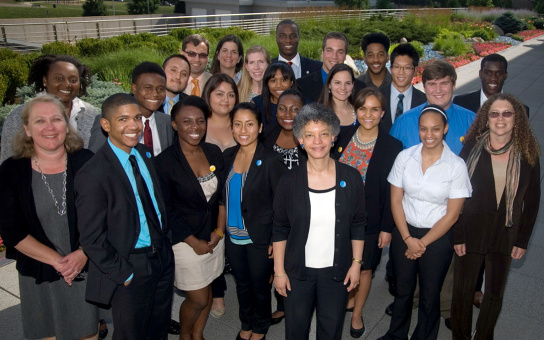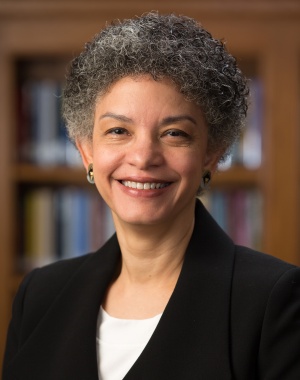
Susan M. Collins, former dean of the Ford School and now president & CEO of the Federal Reserve Bank of Boston, made a welcome return to Weill Hall in November for a public event and lunch with students. During her visit, she shared insights into her transition from academia to the Boston Fed, discussed the bank’s commitment to maintaining its independence, and explored the ways it works to build trust in communities.
What did you take away from your time at the Ford School that helps you in your current position?
For many years, I taught a segment on monetary policy for the Public Policy & International Affairs Junior Summer Institute (PPIA JSI) fellowship program. The students would simulate being on the Federal Open Market Committee (FOMC) and deliberate on what should happen to interest rates and why. Visiting the Detroit branch of the Chicago Fed was great fun, and the experience taught me a great deal.

I love the interdisciplinarity of the Ford School. One of its real strengths is that it emphasizes and teaches the value of bringing different perspectives to bear on a policy challenge. I also developed a new appreciation for the qualitative aspects of social science research.
Now, I apply this perspective about data to my role at the Fed. It’s not just about the statistics, analysis, and forecasts, but also the qualitative data we gather through conversations with employers, civic leaders, and community groups—among many others.
Talk about the Fed’s independence in an era of political pressures.
Congress has tasked us with a dual mandate—to sustain low and stable prices and to create an environment of maximum employment. Research concludes that central banks with greater independence are more effective at achieving price stability due to the credibility of their policies.
Another crucial aspect is the structure of the bank itself. Congress established regional Reserve Banks to connect with local economies, which speaks to the importance of independence. But with that independence there is an expectation of accountability and transparency—those go hand in hand.
In addition to playing a role to secure the safety and soundness of the financial system, we try to understand what the current economic barriers are and bring people together who can directly address them. Our community development team created an initiative called Working Places. In a community that lost its manufacturing base, that lost its main employer, how do you get resurgence? Maybe it’s entrepreneurship, maybe it’s workforce development, maybe it’s bolstering the workforce.
The Fed is a public service institution. Our overarching mission is to support a vibrant economy that works for everybody—not just for some people."
Susan M. Collins
Tell us about the Boston Fed’s mission with respect to the communities in its region.
The Fed is a public service institution. Our overarching mission is to support a vibrant economy that works for everybody—not just for some people. For a variety of reasons, there are barriers that prevent some people from participating [in the workforce] which really constrains how vibrant an economy can be.
Working Places encourages and incentivizes civic groups, philanthropists, and state and local governments to develop strategies together.
How does the Boston Fed approach building trust within communities?
To fight inflation, the Fed’s policymaking committee raises interest rates to try to reduce price pressure, but that’s not super popular.
Not surprisingly, there’s always more attention on the Fed during a period of restriction. As policymakers, we have a responsibility to get out there and to talk about what we’re doing and why we’re doing it and to ask how people are feeling about it. Not everyone’s going to agree, but my experience is that people really appreciate it when we take the time to explain. I’m out there frequently across New England talking to business leaders, small businesses, government officials, and civic leaders. [Building trust] is about transparency, and I think we need to continue to do that.
A lot of people want certainty in what and when something will happen. I understand that it’s very frustrating when we can’t provide that. We don’t know exactly what’s going to happen, and we can’t really pre-commit to what policy should be implemented. We have to make decisions based on all of the data that we have available.
More in State & Hill
Below, find the full, formatted spring 2025 edition of State & Hill. Click here to return to the spring 2025 S&H homepage.
